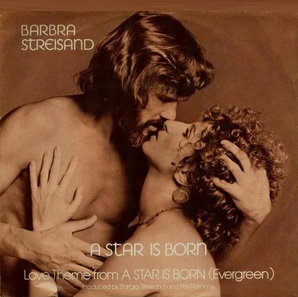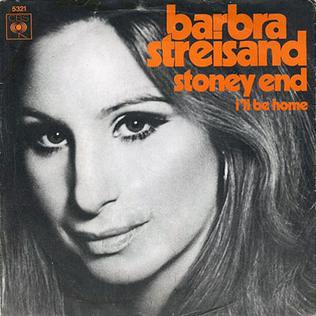
"Evergreen" is the theme song from the 1976 film A Star Is Born. It was composed and performed by American singer, songwriter, actress and director Barbra Streisand with lyrics by Paul Williams, and arranged by Ian Freebairn-Smith. The song was released on the soundtrack album to A Star Is Born.

Celebrate Me Home is the debut studio album by American singer-songwriter Kenny Loggins. It was released on April 13, 1977, by Columbia Records. The album was Loggins' first since splitting from Loggins and Messina, represents a slight move away from the folk-rock leanings of his previous recordings towards a more polished, soft rock sound.

"Woman in Love" is a song performed by Barbra Streisand and taken from her 1980 album Guilty. The song was written by Barry and Robin Gibb of the Bee Gees, who received the 1980 Ivor Novello award for Best Song Musically and Lyrically. It is her fourth of four Platinum records, and is considered her greatest international hit.

"What a Fool Believes" is a song written by Michael McDonald and Kenny Loggins. The best-known version was recorded by the Doobie Brothers for their 1978 album Minute by Minute. Debuting at number 73 on January 20, 1979, the single reached number one on the Billboard Hot 100 on April 14, 1979, for one week. The song received Grammy Awards in 1980 for both Song of the Year and Record of the Year.

Superman (1977) is the nineteenth studio album by American singer Barbra Streisand. The lead single "My Heart Belongs to Me" became a hit in 1977, peaking at #4 on the US pop chart. The title track was released as a follow-up but did not chart as highly as its predecessor. The album peaked at number 3 on the Top 200 LP Billboard album chart and on the UK Albums Chart at number 32. It has sold 2 million copies in United States and was certified 2× Platinum. Streisand co-wrote two songs on the album - "Don't Believe What You Read" and "Answer Me". The latter is also featured on her 2023 compilation album Evergreens: Celebrating Six Decades.

"This Is It" is a song by American musician Kenny Loggins. It was released in 1979 as the lead single from his 1979 album Keep the Fire. It reached number 11 on the Billboard Hot 100 and number 17 on the Adult Contemporary chart. "This Is It" was also successful on the Hot Soul Singles chart, reaching number 19; it was one of two entries on this chart.

"Keep on Singing" is a 1973 song composed by Danny Janssen and Bobby Hart, and was originally recorded by Austin Roberts from the album Austin Roberts. It was released as a single on Chelsea Records and reached No. 50 on the U.S. Billboard Hot 100 and No. 39 on the Cash Box Top 100. In Canada it reached # 79. "Keep on Singing" was best known as a hit single by Helen Reddy in 1974.

"Song Sung Blue" is a 1972 hit song written and recorded by Neil Diamond, inspired by the second movement of Mozart's Piano Concerto #21. It was released on Diamond's album Moods, and later appeared on many of Diamond's live and compilation albums. The song was a #1 hit on the Billboard Hot 100 chart in the United States for one week, the week of July 1, and it spent twelve weeks in the Top 40. It also reached #14 on the UK Singles Chart.

"Love Ballad" is a song by R&B/Funk band L.T.D. Jeffrey Osborne is the lead singer.

"I Believe You" is a love ballad composed by Don and Dick Addrisi which was a 1977 single for Dorothy Moore; taken from her self-titled Dorothy Moore album. "I Believe You" reached #5 R&B and crossed over to the US Pop Top 30 at number 27. The track also reached number 20 in the UK.
"Make Believe It's Your First Time" is a song written by Bob Morrison and Johnny Wilson. Originally recorded by Bobby Vinton, the song was twice recorded by Karen Carpenter, both as a solo act and as a member of the Carpenters.

"Cupid" is a song by American singer Sam Cooke, released on May 16, 1961. It charted at number 17 on the Billboard Hot 100 and number 20 on the Hot R&B Sides chart; the track performed best in the United Kingdom, peaking at number seven on the UK Singles Chart. The song is featured on Cooke's greatest hits album, The Best of Sam Cooke (1962). Cooke's producers had asked him to write a song for a girl they had seen on a Perry Como TV show—but once they heard her sing, they kept "Cupid" for Cooke himself.

"One Less Bell to Answer" is a song written by Burt Bacharach and Hal David. Originally written in 1967 for Keely Smith, the song was rediscovered in late 1969 by Bones Howe, the producer for the 5th Dimension, and the song was included on the group's 1970 debut album for Bell Records, Portrait. Lead vocals on the single were sung by Marilyn McCoo.

"Crying Time" is a song from 1964 written and originally recorded by the American country music artist Buck Owens. It gained greater success in the version recorded by Ray Charles, which won two Grammy Awards in 1967. Numerous other cover versions have been performed and recorded over the intervening years.

"I'm Stone in Love with You" is a 1972 single by the Philadelphia soul group The Stylistics. The song is noted for lead singer Russell Thompkins Jr.'s distinctive falsetto singing, which he employs through most of the record. The song was written by Thom Bell, Linda Creed, and Anthony Bell.

"(Our Love) Don't Throw It All Away" is a song penned by Barry Gibb and Blue Weaver and recorded by the Bee Gees in 1977 on the Saturday Night Fever sessions but was not released until Bee Gees Greatest (1979). A different version was released in September 1978 as the third single by Andy Gibb from his second studio album Shadow Dancing.

Live is a live album by American pop singer Johnny Mathis that was released in October 15, 1984, by Columbia Records and includes performances of some of his classics, songs from recent albums, and three selections that have never appeared on a Mathis studio album.

A Star Is Born is the soundtrack album to the 1976 musical film of the same name, performed by its stars Barbra Streisand and Kris Kristofferson. The album was very successful, holding the number-one spot on the US Billboard 200 chart for six weeks and eventually was certified 4× Platinum by the RIAA for more than four million units shipped and has sold a total of eight million copies worldwide.

"Stoney End" is a song written by Laura Nyro and released in February 1967 on her debut album More Than a New Discovery. According to childhood friend Alan Merrill, Nyro originally intended the song, a gospel-inflected uptempo piece, to be performed at a slower pace. The best known recording of Nyro's album version of the song was a hit for Barbra Streisand in 1970.

"Second Hand Rose" is a 1921 popular song written by Grant Clarke and James F. Hanley for Fanny Brice.



















